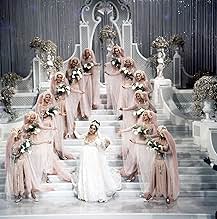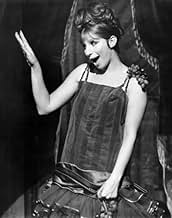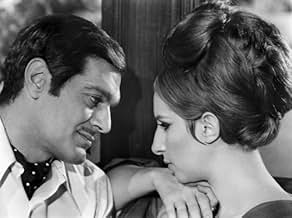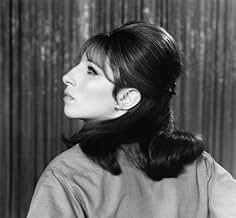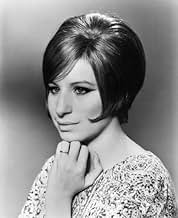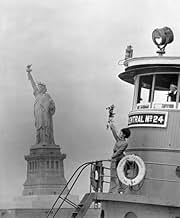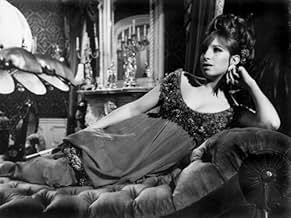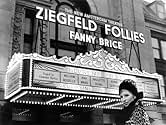PUNTUACIÓN EN IMDb
7,4/10
27 mil
TU PUNTUACIÓN
La vida de Fanny Brice, famosa comediante y artista de principios del siglo XX. Vemos su ascenso a la fama como chica de Ziegfield, su carrera posterior y su vida personal, en particular su ... Leer todoLa vida de Fanny Brice, famosa comediante y artista de principios del siglo XX. Vemos su ascenso a la fama como chica de Ziegfield, su carrera posterior y su vida personal, en particular su relación con Nick Arnstein.La vida de Fanny Brice, famosa comediante y artista de principios del siglo XX. Vemos su ascenso a la fama como chica de Ziegfield, su carrera posterior y su vida personal, en particular su relación con Nick Arnstein.
- Ganó 1 premio Óscar
- 8 premios y 16 nominaciones en total
Karen Stride
- Ziegfeld Girl
- (as Karen Lee)
Reseñas destacadas
Barbra Streisand made one the biggest debuts in the history of films playing Fanny Brice in Funny Girl. She also won an Oscar as best actress of 1967 for her efforts. Although this musical bogs down a bit in the second half, Streisand keeps the viewer glued to the screen with her brilliant portrayal of this great star. Terrific musical numbers come one after another, and Streisand shifts gears effortlessly between comic gems like "I'm the Greatest Star" and "The Roller Skate Rag" and signature tunes like "People" and "Don't Rain on My Parade." Her closing rendition of "My Man" is very effective (and was copied by Diana Ross in Lady Sings the Blues). Big and bright and splashy, Funny Girl is one of the last great, old-style musicals produced in Hollywood. Omar Sharif, Walter Pidgeon, Anne Francis, Kay Medford, Mae Questel, Frank Faylen, and Lee Allen co-star. Meford won a supporting Oscar nomination as the mother. Pidgeon should have been nominated for his role as Flo Ziegfeld. And I think Questel is a scream as the local yenta. But the center of this film is Streisand. Every number is a gem, and she looks great. There may be better musicals, but you'd be hard pressed to name a better performance in a musical than Barbra Streisand playing Fanny Brice in Funny Girl.
Others in the cast include Gertrude Flynn and Penny Santon as the card players, Tommy Rall as the prince in the ballet sequence, Mittie Lawrence as the maid, Gerald Mohr as the gangster, Inga Neilsen and Bettina Brenna as show girls, and Elaine Joyce in the roller skating number.
Others in the cast include Gertrude Flynn and Penny Santon as the card players, Tommy Rall as the prince in the ballet sequence, Mittie Lawrence as the maid, Gerald Mohr as the gangster, Inga Neilsen and Bettina Brenna as show girls, and Elaine Joyce in the roller skating number.
Wow, was Barbra ever great in this one! The delivery of the songs, in which she often gets so intoxicated with the great music and lyrics that she starts swaying. The acting, which certainly is none too bad, either. The sheer beauty of her performance is indescribable. Really, I am not exaggerating. She is radiant in just about every frame of the film that she appears in; she practically glows! She is gorgeous, she really is! You cannot help but love this kid from the moment she steps onto the screen. She is funny, she is touching, she is electric, she is wonderful, and she is so many other things.
Omar Sharif certainly is suave as her leading man (And you know exactly how he feels, because you love her, too!), and Kay Medford is also good as her mother. William Wyler's direction is right on the money. And those costumes and sets! But, of course, the film belongs to Barbra. It may drag quite a bit near the end, but she pulls it through. This was her first film, before the egomania, (evident in only her second film, Hello, Dolly!), before the sappy stuff. This was made when she was a fresh young talent who had "so much to offer." And boy, did she deliver the goods in this one! If you see this, you can certainly consider yourself one of the luckiest people in the world.
Omar Sharif certainly is suave as her leading man (And you know exactly how he feels, because you love her, too!), and Kay Medford is also good as her mother. William Wyler's direction is right on the money. And those costumes and sets! But, of course, the film belongs to Barbra. It may drag quite a bit near the end, but she pulls it through. This was her first film, before the egomania, (evident in only her second film, Hello, Dolly!), before the sappy stuff. This was made when she was a fresh young talent who had "so much to offer." And boy, did she deliver the goods in this one! If you see this, you can certainly consider yourself one of the luckiest people in the world.
Every time a film is made about a real-life figure, particularly a show business figure, people love to complain that the movie is not accurate regarding the facts of that person's life. If the truth be told, if movie biographies were strictly about the facts, no one would go to see them, because for the most part, the facts don't make for great entertainment and Fanny Brice is no exception. The 1968 musical FUNNY GIRL has been maligned for years because it is not a very accurate representation of the facts of Fanny Brice's life. If you want to learn about Fanny Brice's life, read a biography or go on the internet, but if you want to see an amazing movie musical spotlighting a legendary performer at the beginning of her amazing career, then you can't beat FUNNY GIRL, the 1968 musical based on the 1964 Broadway musical that made Barbra Streisand a star. Streisand tied with Katharine Hepburn for the Best Actress Oscar for this charismatic star turn as the young girl from Henry Street who becomes a big star of the Ziegfeld Follies and has a heartbreaking romance with a charming gambler named Nick Arnstein, played by Omar Sharif. Streisand is in practically every frame of this film and never makes you wish otherwise...one of the great performances in the history of cinema...whether she is defying Florenz Ziegfeld by refusing to appear in the finale or chasing an ocean liner to be with Nick, Streisand gives the one-woman performance of a lifetime here. Directed by Oscar-winner William Wyler, Streisand is lovingly photographed and effectively showcases the Jule Styne-Bob Merrill score, which includes classics like "People" and "Don't Rain On My Parade". Some changes have been made in the score from the stage musical but Streisand makes it all work and the finale "My Man" is just devastating. It's not an accurate biography of the vaudeville legend, but as a dazzling and entertaining movie musical, it's hard to top this one.
I've decided to purchase all of Omar Sharif's movies of the 60s and have myself an Omar Sharif film festival, thanks mainly to this movie! Sure, Barbra has always been my favorite songbird, and without a doubt, after seeing her here, hello--she deserved that Oscar, hands down. But "it" boy of the 1960s Omar Sharif was just achingly splendid as suave, cultured gentleman and card shark Nick Arnstein. No big stretch for the guy though, who was schooled in French and English schools, in addition to being a professional bridge player and, like Nick Arnstein, also owns racehorses (much later in life, he too almost lost his shirt to gambling). The chemistry between both stars work very well, and the seduction scene was quite funny (what nonchalance indeed, putting beds in restaurants) and and Mr. Sharif could have, should have pursued a singing career with that wonderful voice and patented accent! Rumors were rife that both were having an affair while filming. Barbra, you certainly were on a roll. Note to Omar: I am woman...and YOU'RE THE MAN!
I've seen this film many times,and I've always thought it was one of Barbra Streisand's best films because it allowed her to use her strengths as a comedian, singer, and dramatic actor. It's clear that her presence dominates the movie; however, there are some excellent supporting players, including Kay Medford as Fanny Brice's mother Rose and Walter Pigeon as Florenz Ziegfeld, two very fine character actors. Rose is particularly likable because, unlike her daughter Fanny, she sees things as they are and not the way they should be. This applies to her comment about Nick Arnstein, the handsome gambler that Fanny marries, despite the fact that Rose perceives him to be a "sponge."
Fanny, as shown in this film, is also very likable not only because of her humor but for her generosity and thoughtfulness. Her ambition, of course, is to conquer the stage and she does so fairly quickly after making a great mess of a roller skate number at the local dance hall. Before long, Fanny is auditioning for Ziegfeld, the famous impressario and she wins him over with her talent and charm. Nick Arnstein, a man about town, always seems to be around Fanny when she triumphs on the stage and this time is no different. He buys her a beautiful bouquet of roses with a note, "Dear Star, I told you so." Very soon, Fanny and Nick become involved in a relationship which is often on and off until Fanny literally proposes to him. What follows is a heartbreaking story of a young woman whose desire to be loved for herself alone and her passion for a happy domestic life is thwarted by fate and some wrong choices.
After a montage of the first year of their marriage together, problems start affecting the Arnstein marriage. It is true that they are wealthy people; however, their problems aren't minor. Nick begins to lose heavily at the gaming table and everything he tries ends in failure. Fanny, on the other hand, continues to be successful on the stage and Nick starts to resent her. Suddenly, all of his gentlemanly charm and good manners disappear as if by magic; he's rude to Fanny, making her upset over things that a truly married couple would find a way to resolve. Indeed, he starts ignoring her deliberately and places his interests and needs above hers. After a while, the marriage collapses not because of Fanny's career but the way in which Nick looks at their relationship (we discover this near the end of the film.) He also conceals his financial problems from her, shutting Fanny out of his life as though she didn't exist.
All of this culminates in Nick's unfortunate involvement in a shady bond scheme which sends him to prison for two years. I would say that these problems are rather huge. I don't want to give more away because I feel others should have the opportunity to see the film and judge for themselves. But I have to say that the ending of the movie, is, in my opinion, one of the most heartfelt, dignified, and classiest moments ever put on film. And Barbra Streisand makes the most of it, touching us not only with her excellent performance of the song "My Man" but also by the way her Fanny carries herself, taking responsibility for her choice and showing that she will go on with her life, despite what's happened to her.
Fanny, as shown in this film, is also very likable not only because of her humor but for her generosity and thoughtfulness. Her ambition, of course, is to conquer the stage and she does so fairly quickly after making a great mess of a roller skate number at the local dance hall. Before long, Fanny is auditioning for Ziegfeld, the famous impressario and she wins him over with her talent and charm. Nick Arnstein, a man about town, always seems to be around Fanny when she triumphs on the stage and this time is no different. He buys her a beautiful bouquet of roses with a note, "Dear Star, I told you so." Very soon, Fanny and Nick become involved in a relationship which is often on and off until Fanny literally proposes to him. What follows is a heartbreaking story of a young woman whose desire to be loved for herself alone and her passion for a happy domestic life is thwarted by fate and some wrong choices.
After a montage of the first year of their marriage together, problems start affecting the Arnstein marriage. It is true that they are wealthy people; however, their problems aren't minor. Nick begins to lose heavily at the gaming table and everything he tries ends in failure. Fanny, on the other hand, continues to be successful on the stage and Nick starts to resent her. Suddenly, all of his gentlemanly charm and good manners disappear as if by magic; he's rude to Fanny, making her upset over things that a truly married couple would find a way to resolve. Indeed, he starts ignoring her deliberately and places his interests and needs above hers. After a while, the marriage collapses not because of Fanny's career but the way in which Nick looks at their relationship (we discover this near the end of the film.) He also conceals his financial problems from her, shutting Fanny out of his life as though she didn't exist.
All of this culminates in Nick's unfortunate involvement in a shady bond scheme which sends him to prison for two years. I would say that these problems are rather huge. I don't want to give more away because I feel others should have the opportunity to see the film and judge for themselves. But I have to say that the ending of the movie, is, in my opinion, one of the most heartfelt, dignified, and classiest moments ever put on film. And Barbra Streisand makes the most of it, touching us not only with her excellent performance of the song "My Man" but also by the way her Fanny carries herself, taking responsibility for her choice and showing that she will go on with her life, despite what's happened to her.
¿Sabías que...?
- CuriosidadesWilliam Wyler was asked by a friend whether Barbra Streisand had been hard to work with. He replied, "No, not too hard, considering it was the first movie she ever directed."
- PifiasAfter Nick's release from prison in 1927, he and Fanny did not sadly but amicably part. Instead, Nick rewarded Fanny's years of support by almost immediately starting a series of affairs. Fanny demanded he give her grounds for divorce and even had their children's last name legally changed to Brice. Although he and Fanny would meet again several years later, he never attempted to see his children again.
- Citas
Fannie Brice: I'm a bagel on a plate full of onion rolls!
- Versiones alternativasThe original theatrical version included an additional overture before the opening credits, an intermission after "Don't Rain On My Parade," and exit music after the end credits. These additional music pieces have been restored for the DVD release.
- ConexionesFeatured in This Is Streisand (1968)
Selecciones populares
Inicia sesión para calificar y añadir a tu lista para recibir recomendaciones personalizadas
- How long is Funny Girl?Con tecnología de Alexa
Detalles
- Fecha de lanzamiento
- País de origen
- Idioma
- Títulos en diferentes países
- Funny girl
- Localizaciones del rodaje
- Jersey Central Railway Station, Jersey City, Nueva Jersey, Estados Unidos('Don't Rain On My Parade' sequence)
- Empresas productoras
- Ver más compañías en los créditos en IMDbPro
Taquilla
- Presupuesto
- 14.100.000 US$ (estimación)
- Recaudación en Estados Unidos y Canadá
- 52.223.306 US$
- Fin de semana de estreno en EE. UU. y Canadá
- 65.560 US$
- 3 sept 2001
- Recaudación en todo el mundo
- 52.225.786 US$
- Duración2 horas 31 minutos
- Color
- Relación de aspecto
- 2.35 : 1
Contribuir a esta página
Sugerir un cambio o añadir el contenido que falta

Principal laguna de datos
What is the Japanese language plot outline for Funny Girl (Una chica divertida) (1968)?
Responde



